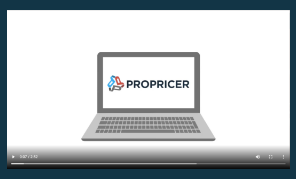Whether you're assembling a contract pricing team from scratch or enhancing an existing one, there are essential practices that can help your team reach its peak.
In this blog, we'll explore how to build the right team, involve its members in contracts early, help them master pricing strategies and analyses, and encourage them to partner effectively in proposal writing and review.
Additionally, we'll delve into the importance of establishing a deep knowledge base, discovering advanced tools, and leveraging external resources like Apex Accelerators.
Grow the right team
Ideally, your contract pricing team consists of people with experience handling pricing for multiple contracts and who have an established track record of performance. What else? They should bring proposal-level insights, helping you better address a client's Request for Proposal (RFP).
But often, you don’t have the luxury of a seasoned pricing team. When building a team from scratch, look for strong negotiators, analytical thinkers, and experts in cost analysis. Also, a group composed of diverse members fosters innovation and a broader perspective in contract pricing strategies.
Create a strong team culture that encourages collaboration and camaraderie. Provide guidance, training, and regular communication to keep your team motivated and aligned with your goals.
Involve your team in contracts early
To make a significant impact on a contract, involve your pricing team members early in the pursuit. Because they think in financial models, your team members can help identify win themes, help make quick go/no-go decisions, and bring past contract-level intelligence to initial briefings and pre-award work. Early involvement enables your team to tailor more flexible pricing strategies and maximize your chances of success.
Formulate pursuit-based strategies
Collaboration with the contract initiation, Basis of Estimate (BOE), and narrative writing teams is essential to make early decisions on a proposal's structure. Finalize financial aspects such as volume discounts, margin percentages, value-added incentives, and complimentary services in collaboration with these teams. An integrated approach ensures that your pricing strategy aligns seamlessly with the proposal’s overall intentions.
Conduct market research
By gathering data on market conditions and pricing trends for similar goods and services, you can compare your pricing to industry standards. Conduct research through various methods, including online searches, surveys, and consultations with industry experts. The information you glean is invaluable in setting competitive prices, which is often the most crucial factor in winning government contracts.
Run a thorough cost analysis
Cost analysis involves a detailed examination of the costs associated with delivering goods and services. It includes assessing direct and indirect costs, overhead expenses, labor rates, and material costs. Conducting a comprehensive cost analysis ensures that your pricing accurately reflects the actual costs of delivering goods and services. This approach enhances transparency and reduces the risk of overcharging the government—a surefire way to miss a contract shortlist.
Master FAR price analysis techniques
Ensure you establish price reasonableness as outlined in the Federal Acquisition Regulation (FAR) guidelines.
This process involves examining pricing data to determine whether prices are reasonable based on market conditions and historical data. Use pricing analysis software, such as ProPricer Contractor Edition, to efficiently compare your prices to industry benchmarks. ProPricer’s intuitive approach allows for quick and data-driven demonstrations of price reasonableness. Contact ProPricer for a demo >
Partner in proposal writing & review
Your modern pricing team should be able to quickly evolve into a partnership role, reviewing overall proposals to ensure they meet client requirements and effectively communicate all pricing factors. The team should also be able to run leadership review cycles, comparing solutions to similar deals and drawing on market intelligence from benchmarking and sometimes third-party advisors.
Lead negotiations
Empowered pricing teams now lead contract negotiations, leveraging data-based insights on markets, accounts, and competition. Your most effective team can design fallback options and employ real-time decision-making to secure Best and Final Offer deals efficiently.
Efficiency in negotiations with government agencies is crucial. Collaborate with suppliers to encourage innovation and efficiency, providing them flexibility in proposing alternative solutions should costs come into question. Focus on broad functional requirements rather than rigid specifications to enhance the experience of all parties involved.
Build a deep knowledge base
Collect data from various sources, including third-party benchmarking vendors and external experts. Maintain an updated repository of market and competitive pricing/solution data to sharpen your competitive edge in every pursuit.
Take advantage of Apex Accelerators
Consider consulting with an Apex Accelerator near you for external assistance in managing your pricing team—or perhaps just to gain an objective perspective. Your local Accelerator can help immensely by offering valuable support and resources.
Conclusion
Pricing responsibilities at a contracting firm run the gamut: Opportunity blocking and tackling, proposal collaboration, in-depth market awareness, agency negotiation, and more.
Your contract pricing team can help set the parameters. But it’s you who needs to set the guardrails for those parameters. Pricing is your foundation right now. But effectively steering entire proposals is your near future.
Sources
- BCG Report: Five Ways to Speed Up Government Procurement
- Everest Group Blog: Evolution of Pricing Teams - Pricing Support to Strategic Partners in Winning Deals
- LinkedIn Article: ProPricer Insider - Maximize Your Government Contract Pricing Team’s Potential
- LinkedIn Article: ProPricer Insider - Price Reasonableness in Government Contracts
- DAU Website: Fair and Reasonable Price Determination




